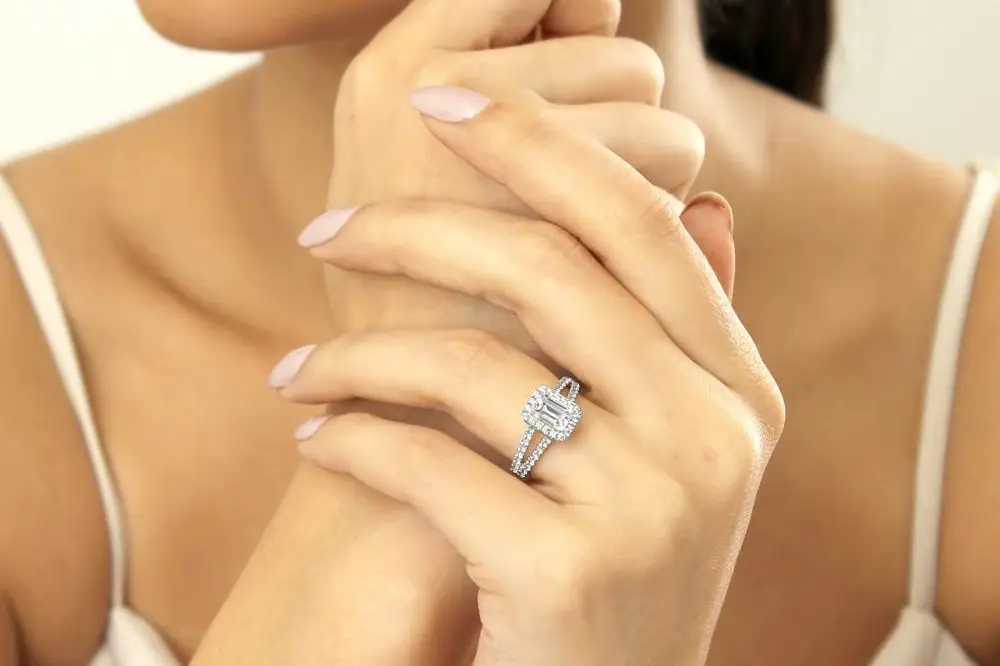Choosing an engagement ring is a deeply personal decision, symbolizing a commitment to love and partnership. However, today’s consumers are increasingly concerned with the ethical implications of their purchases. “Ethical engagement rings” have become a popular choice for couples looking to minimize the environmental and social impact of their ring selection. This guide will explore what makes an engagement ring ethical, the types available, and how to find a ring that aligns with your values and style.
Table of Contents
ToggleWhat Are Ethical Engagement Rings?
Ethical engagement rings are crafted in a manner that avoids harm to people and the planet. Traditional diamond mining has often been associated with environmental damage, human rights abuses, and unethical labor practices. In response, the jewelry industry has made strides in offering more sustainable and transparent options. Ethical engagement rings are often made with conflict-free diamonds, lab-grown gems, or recycled metals, ensuring that each component is responsibly sourced and produced. By choosing an ethical engagement ring, you are supporting fair labor practices, reducing your environmental impact, and promoting a sustainable jewelry market.
Why Choose an Ethical Engagement Ring?
Selecting an ethical engagement ring reflects a commitment to values that extend beyond personal relationships. Opting for ethically sourced jewelry demonstrates awareness of global issues, like labor exploitation and environmental conservation, that are associated with traditional mining. Many consumers feel empowered by choosing ethical engagement rings because they know their purchase does not contribute to environmental harm or human suffering. Ethical engagement rings also offer transparency in their sourcing and production, often certified by trusted organizations like the Kimberley Process, which helps ensure that diamonds are conflict-free.
Different Types of Ethical Engagement Rings
Ethical engagement rings come in various forms to suit different preferences and budgets. Here are the most common types:
Conflict-Free Diamonds
One of the most popular choices in ethical engagement rings is the conflict-free diamond. These diamonds are mined in regions that follow fair labor practices and are not involved in financing armed conflicts. Conflict-free diamonds come with certifications to ensure they meet these standards, allowing consumers to verify the ethical origin of their stones.
Lab-Grown Diamonds
Lab-grown diamonds are an increasingly popular choice for ethical engagement rings. These diamonds are created in laboratories under controlled conditions that replicate the natural formation process. lab grown diamonds are chemically and visually identical to mined diamonds but come without the environmental impact or ethical concerns. As a bonus, lab-grown diamonds are often more affordable than their mined counterparts, making ethical engagement rings more accessible for all budgets.
Fair Trade and Recycled Metals
Ethical engagement rings are not just about the gemstone; the metals used in the band are equally important. Many ethical engagement rings feature recycled metals or metals sourced from Fair Trade-certified mines. By using recycled gold, silver, or platinum, these rings minimize the environmental footprint of mining new materials. Fair Trade metals come from mines where workers are treated fairly, ensuring that each ring supports safe working conditions and sustainable practices.
Gemstone Alternatives
For those who prefer alternatives to diamonds, ethical engagement rings can be crafted using gemstones like sapphires, rubies, or emeralds. Many of these stones are available in Fair Trade-certified options or can be lab-grown to ensure ethical sourcing. Gemstone engagement rings offer a unique and colorful alternative while still adhering to ethical standards.
How to Choose the Right Ethical Engagement Ring
Finding the right ethical engagement ring involves considering both your values and aesthetic preferences. Start by identifying which ethical aspects are most important to you. Do you prioritize conflict-free diamonds, or would you prefer a lab-grown option? Are recycled metals a must for you? Once you’ve established your priorities, research jewelers who specialize in ethical engagement rings. Look for certifications such as the Kimberley Process for diamonds, Fair Trade certification for metals, and trusted laboratory sources for lab-grown gems.
Benefits of Buying Ethical Engagement Rings
The benefits of buying ethical engagement rings extend beyond the positive impact on the environment and human rights. Here are a few reasons why more couples are choosing ethical engagement rings:
Aligns with Personal Values
For many, ethical engagement rings represent a chance to put their values into action. By purchasing an ethically sourced ring, you can feel confident that your engagement symbolizes a commitment to a brighter, more responsible future. Ethical engagement rings allow you to invest in a symbol of love that aligns with a commitment to fairness, transparency, and sustainability.
Ensures Quality and Transparency
Ethical engagement rings often come with certifications and documentation that provide details about the origin of the materials. This transparency allows consumers to make informed decisions and provides peace of mind that their ring meets ethical standards. Jewelers specializing in ethical engagement rings tend to prioritize quality, ensuring that each ring is both beautiful and responsibly sourced.
Supports Ethical and Sustainable Practices
Choosing ethical engagement rings directly supports companies and artisans who adhere to fair labor practices and sustainable sourcing. This conscious choice helps reduce demand for unethical mining practices and encourages the jewelry industry to adopt more ethical standards. By opting for ethical engagement rings, consumers are actively contributing to a positive shift within the industry.
Where to Find Ethical Engagement Rings
Several reputable jewelers specialize in ethical engagement rings, offering a variety of styles to fit every taste. Companies like Brilliant Earth, MiaDonna, and Vrai & Oro are known for their commitment to ethical practices. When searching for ethical engagement rings, look for jewelers who are transparent about their sourcing and production processes. Most ethical jewelers provide information on where their diamonds and metals come from, and many offer certifications or traceable sourcing.
Tips for Maintaining Your Ethical Engagement Ring
After choosing an ethical engagement ring, it’s essential to care for it properly to maintain its beauty and longevity. Here are some tips:
- Regular Cleaning: Ethical engagement rings, especially those with gemstones or diamonds, should be cleaned regularly. Use gentle, eco-friendly solutions to avoid damaging the metal or gemstone.
- Routine Inspections: Regular inspections by a jeweler will ensure that your ethical engagement ring remains in good condition. Loose stones or damaged settings can be fixed early to avoid further issues.
- Proper Storage: Store your ethical engagement ring in a safe, cushioned place when not in use. This prevents scratching or other damage, helping your ring last a lifetime.
Final Thoughts on Ethical Engagement Rings
Ethical engagement rings offer a meaningful way to celebrate love while respecting the planet and the people who inhabit it. By choosing an ethically sourced ring, you’re not only making a beautiful choice but also making a powerful statement about your values. Whether you choose a conflict-free diamond, a lab-grown gem, or a ring made with recycled metals, ethical engagement rings reflect a commitment to a better world. In this way, an engagement ring becomes more than a piece of jewelry; it becomes a symbol of love, integrity, and responsibility.









